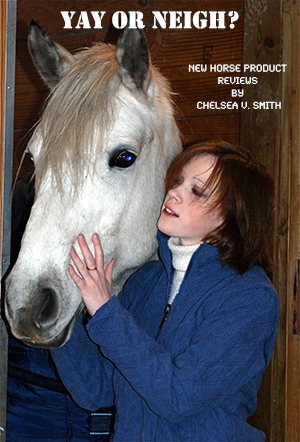El Rocio Pilgrimage Andalusia, Spain Kills Horses, Mules & Oxen Every Year
"Is Spain Doing Enough to Save Them?"
by Nikki Alvin-Smith
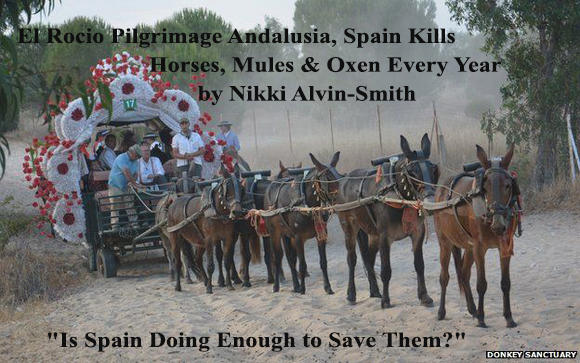
I have been blessed to visit the wonderful region of Andalusia many times during my career with horses and have friends in the beautiful region of Sanlucar and Jerez. While riding through the port wine country on horseback and splashing through the surf on the beach aboard a princely PRE stallion has been a blast, I, like many, were unaware that each year the pilgrimage event that takes place in this lovely area in Southern Western Spain, has killed more than 230 horses, mules, donkeys, and oxen since the year 2000.
I have witnessed many horse fairs and events in both Portugal and Spain, and I must admit to seeing some abuse of horses along the way. Whether by neglect or inadvertently due to lack of education, the region has some way to go to improve the humane treatment of these animals.
It is hard to fathom that the small hamlet of El Rocio, home to just 2000 inhabitants in rural Andalusia, draws in over one million pilgrims each year. A ritual unchanged for centuries, this worship of a 13th Century effigy known as the Virgin of Rocio includes everything you would expect from an Andalusian celebration. Flashing flamenco dresses, conspicuous consumption of glasses of sherry, port, and cold beers, and the endless parade of carts pulled by oxen and mules or horse riders are a sight to behold.
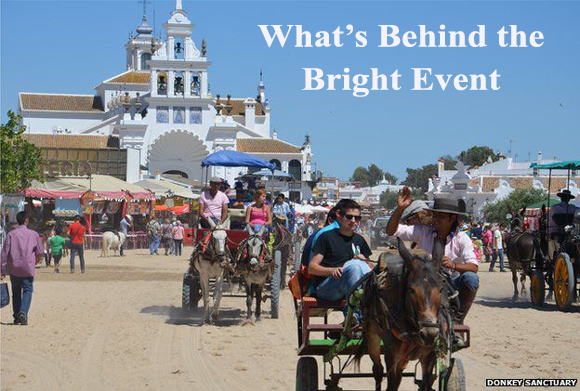
But the week long pilgrimage is made in hot early Spring weather with temperatures sometimes as high as 95 degrees Fahrenheit. An amazing 12,000 -15,000 horses, mules, donkeys, and oxen plod along the route each year and the large religious groups called ' hermandades' pitch camp along the route. Some of the animals are not owned by the riders/drivers but are rented out. These 'rented' beasts are often times injured, old and lame. Sadly, it has been reported that the mistreatment and lack of care goes as far as just leaving a horse dead by the side of the road.
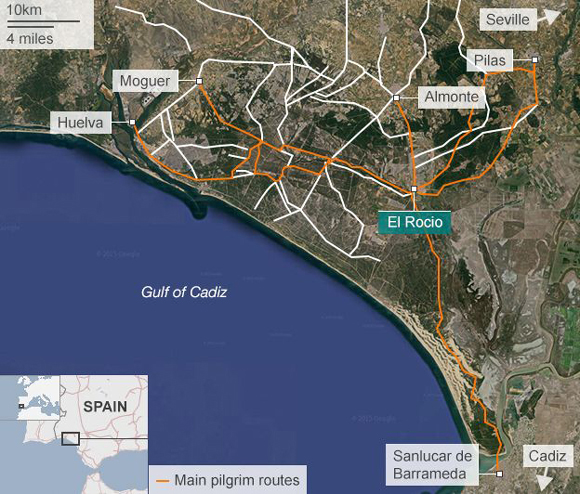
The authorities seemed previously reluctant to do much about the issue. Jose Alfaro, the head of Seprona, the wildlife and environmental protection arm of the Civil Guard in the Huelva province goes as far as to say, "It's unavoidable that some animals die during the pilgrimage, despite the best efforts of their owners." But thanks to the efforts of a few, times are changing.
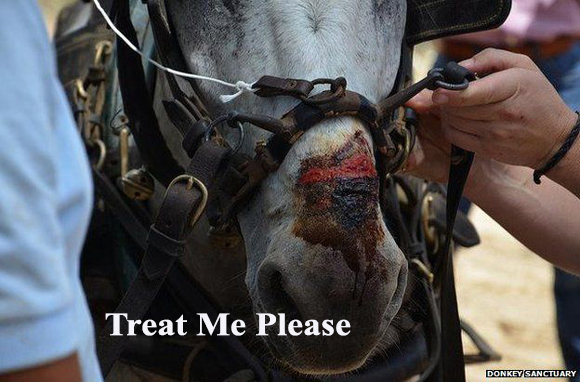
Huge kudos to the Refugio del Burrito and the UK's Donkey Sanctuary who this year again, sent a team of vets and animal welfare specialists. While temperatures in 2015 were thankfully, not as high, resulting in fewer deaths than prior events, with eight horses dying, the 2015 team of thirty dedicated medical professionals and specialists treated nearly 200 animals affected by injuries, exhaustion and dehydration. In prior years, the pilgrims have been wary of the 'blue-shirted' volunteer medical effort, but this year they were more receptive which was a step in the right direction.
In one of the worst cases two rented mules collapsed after 16 hours of carrying partygoers without rest. Lt. Jose Alfaro suggests it is wrong to concentrate on the deaths that occur in these animals during El Rocio and focus instead on the improvement in the animal's welfare. Apparently they have had no criminal offenses for animal cruelty where the animal's life has been in danger, though 29 cases have been reported for ill treatment or neglect.
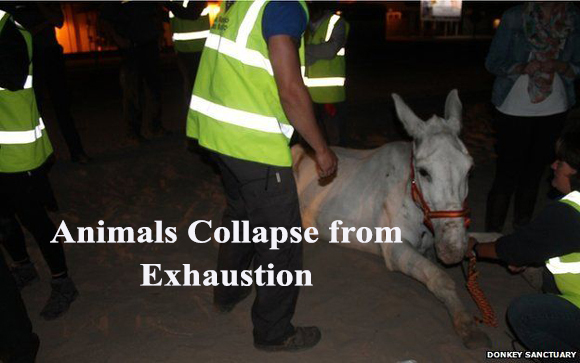
If the Spanish do not do something to improve the overall welfare of these animals, not just in the hot dusty streets of Andalusia, but in the cities of Malaga and Seville where carriage horses require more regulations for their health and safety, then the animal welfare organizations will continue to fight on behalf of the animals. Whether the abuse and neglect are wanton or unintentional the outcome is the same.
The nation who now fields Olympic teams in all the major disciplines and has enjoyed much medal success, also exports horses extensively to the USA and other nations. The life back home in Spain for the backyard equines is being forced into the limelight of a proud nation for immediate attention and remedy. Traditions will continue, but we hope in a kinder more humane manner.
Editor's Note: Our thanks to the Donkey Sanctuary for use of these photos.

